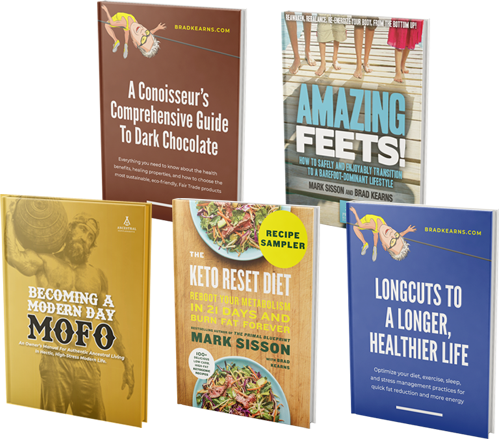I discussed my blood test recommendations in a recent podcast episode—an important topic to discuss since 1) typical screenings barely scratch the surface and 2) there are so many flawed and dated misconceptions about the mainstream medical system blood screening and disease risk factors—the most glaring being the oversimplification of LDL cholesterol as “bad” cholesterol and the notion that measuring LDL value is a reliable indicator of heart disease risk. (To listen to the episode and hear which tests I recommend, as well as how to get a better understanding of your test results, click here. If you want to find out the truth about cholesterol, click here for a great episode of the Huberman Lab podcast with Dr. Peter Attia.)
As I discussed in the episode, so many widely-respected, forward-thinking experts like Dr. Cate Shanahan, Dr. Ron Sinha, Dr. Peter Attia, and Dr. Paul Saladino all agree on the most important heart disease/metabolic health markers being triglycerides-to-HDL and fasting insulin—not total LDL. Therefore, when you order important cardiovascular/metabolic health tests, you should know not to look at LDL and other outdated markers, and what to look for instead:
Triglycerides-to-HDL ratio. This is the single best metabolic/cardiovascular disease tracker. An ideal ratio is 1:1 or better, and it’s urgent to get under 3.5:1 and to get triglycerides under 150 (although under 100 is better), HDL over 40 (over 60 is better). For example, 78/78 would be a great blood test.
Fasting insulin. Dr. Saladino says this is his #1 favorite marker, but doctors rarely order it. In terms of numbers, it’s urgent to get under 15, good if you’re under 5, and excellent if you’re under 3.
ApoB. This measures a protein present in all LDL particles, so it’s predictive if one’s LDL is troublesome or not. Dr. Attia is obsessed with this number for heart disease risk and even likes to drug people to lower the number under 40.
Body composition. Look at Dr. Gabrielle Lyon promoting “muscle-centric medicine” and Dr. Layne Norton promoting “energy toxicity” as the #1 public health problem in a nutshell, revealing that any improvement in body composition (losing fat and/or gaining muscle) delivers comprehensive improvement in blood tests and disease risk factors.
What’s the deal with total LDL?
Unfortunately, this is a very poor marker for heart disease risk. LDL are the “firefighters at the scene of the fire, but didn’t cause the fire.” LDL is important for testosterone production and other important hormone status, but any doctor who says the words “bad cholesterol” or “high LDL, so take statins” to you is 40-50 years behind emerging research. Paul Saladino says, “Don’t worry about “bad” cholesterol” for a reason, and for those considering statins, it’s important to know that the only benefit proven of taking statins is for previous heart attack victims or those who refuse to change their diet. Once you start taking statins, the main side effect you’ll experience is diminished mitochondrial function, so you’ll feel really tired. This is one of many reasons Dr. Sinha says: “Statins are a last resort for poor slobs (i.e., not rich mofos) who refuse to change their diet.”
If you’re skeptical about LDL, please note the widely-touted UCLA meta-study that revealed that 80% of heart attack victims had “normal” LDL, and just look at Tim Russert, the CNN anchor who died of a heart attack at 51, who had total cholesterol of 110. And if you have any concerns about increased LDL, your next move should be to test for “particle size.” You can have large, fluffy LDL ( which are largely harmless) or “small, dense LDL” (which are potentially problematic if your triglycerides are high and HDL is low).

Sex hormone panels. Serum (total) Testosterone, free T, and SHBG (sex hormone binding globulin) for sure. I monitor these three more than anything. I’ve had so many tests over the last four years or so (probably over 25) that they know my name at the blood lab now. It’s $68 on UltraLabTest.com, and all you need to do is go down to the local blood lab, get drawn, and then you get email results. Because male hormone status is a proxy for overall health and vitality, you want numbers in the superior category—not the average category since average today is pretty pathetic. Also, keep in mind that numbers dip when you overtrain, overstress, etc., so I track them often because I know how sensitive they are. Normal serum T range is 200-1000, but it’s ideal to be over 500 and beyond.
Vitamin D: Over 30 is “normal” but vitamin D experts like Dr. Michael Holick (author of The Vitamin D Solution) want over 50 and up to 80 for ideal status. Low vitamin D increases the risk of all cancers—especially reproductive cancers.
Hemoglobin, Hematocrit, Iron for ‘blood viscosity.’ A high hematocrit can be troublesome for the average person (being indicative of sludgy blood). Endurance athletes dope to increase hematocrit but naturally high (~50) is a potentially bad sign (normal is 42-45 for males.) Mike Mutzel of High Intensity Health has a YouTube video on this subject. He says 8 of 10 male clients have markers of high blood viscosity and it’s worse than high cholesterol. If you fall in the high range, donate blood—immediately and regularly.
Fasting glucose and HbA1c.
A Colonoscopy: Do one once every 10 years, or every five if polyps are found.
Coronary artery calcium scan (aka a calcium scan, aka an Agatson scan). I had to pay out of pocket ($300) at a special imaging center for this test, which shows plaque building on arteries. Endurance athletes are at high risk here, due to repeat overuse inflammation and scarring of the heart. If you have a high number, further testing is necessary. In many cases, endurance athletes with high CAC scores show plaque that is stable and calcified, which is less health-concerning than unstable plaque found in patients at high risk for heart attack. Just something to watch in the years ahead, hoping to stabilize whatever CAC score you have. CAC scores will not lower, so your goal for the rest of your life is to keep that number level from growing. My very, very fit lifelong athletic friend, who is now 60, had an alarming score of 400 about 6 years ago, so he monitors it and is trying to keep it around 400. The goal is to have a 0, but it’s good to get it checked and then see if you need to further monitor.
You can also do a “stress EKG” test at a cardiologist’s office so they can see your heart under stress, not just at rest (something I did recently).
Blood pressure: Hypertension puts excessive stress on the cardiovascular system, increasing the risk of heart attacks, strokes, aneurysms, and kidney failure. This can be caused by unhealthy lifestyle practices, such as excessive intake of carbohydrates, sodium (largely from processed foods), and industrial seed oils, poor sleep habits, insufficient exercise, smoking, high levels of life stress, and genetic factors. Most medical experts believe the safe blood pressure threshold is a diastolic/systolic reading of 120/80 or lower (for each number).
Here are some possible tests to get if you have a health problem:
Comprehensive thyroid panels. You can read more details about this in Elle Russ’ fantastic book, The Paleo Thyroid Solution.
Inflammatory markers like HsCrp, CPK, homocysteine, IL-6, and Lp2A.
DHT, LH, FSH, Estradiol (E2) high sensitivity, DHEA-S (precursor to sex hormones), and IGF-1 (insulin growth factor). There are home testing kits for many different hormones available at zrtlabs.com.
Lastly, consider testing for gut health/gut dysfunction. This is something functional medicine doctors will try to test for, but it’s an emerging field, and some question the accuracy of gut tests/food sensitivity tests. However, I do know people personally who have experienced great results from getting stool and food sensitivity tests, so I think if you have a specific health problem, this can be a worthwhile avenue to pursue.









